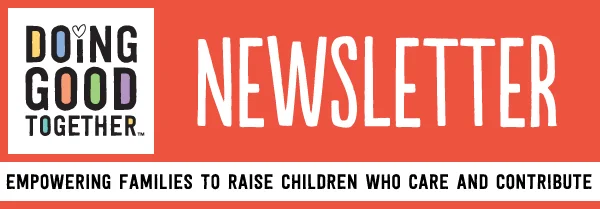PRAISE WORTHY? TIPS FOR EFFECTIVE PRAISE
To praise or not to praise? I wouldn't blame parents for being confused. We've been getting lots of messages about praising children, many of them seemingly contradictory. If you don't praise your kids, they'll lack self-esteem! Over-praise your children and you'll create a junkie who expects applause for the smallest accomplishment! In fact, the answer is not very complicated, and the line between too little and too much praise isn't quite as narrow as you might think. Here's some guidance from researchers for using (well-directed) praise to empower kids and encourage kindness, empathy and hard work.
– Jenny Friedman, Executive Director
TIPS FOR EFFECTIVE PRAISE
Make a Difference.....
- It may sound counter-intuitive, but praising your child's character, not behavior, is the most effective way to teach thoughtfulness. Kids who hear, "It was good that you shared" are less likely to repeat their kindness than children whose character is praised: "You're the kind of person who shares with others."
- When you express disapproval, make it about the behavior, which the child has the ability to change, not about their character. Teach your child to view others in the same way. If your child sees another child refusing to share, or littering, or throwing a tantrum, explain that while the behavior may be wrong, it doesn't make the child "bad."
- Treat your child as if growth is possible. You've probably heard about a "growth" mindset versus a "fixed" mindset. Kids with growth mindsets believe that hard work pays off. Those with fixed mindsets believe that innate ability determines success. Believing that success results from one's innate ability depresses motivation, while believing that effort is critical to success makes one more likely to take on new challenges. Praising effort and asking questions about your child's process helps him or her become "mastery-oriented" and more likely to try hard next time.
- Don't reward kindness (or other behavior you can naturally expect from your child) with money or prizes. Even too much verbal praise can diminish a child's own sense of motivation, especially when the behavior is something the child truly enjoys doing.
- Be specific in your praise. Saying "You're thoughtful "is much less effective than describing the particular characteristic you admire. "You're really able to tune in to how other kids are feeling."
- Sincerity matters. Very young children thrive on praise. But as kids get older, they scrutinize praise to see whether it's realistic, proportionate -- and true. So instead of saying, "You're the next Michael Jordan" when your child does well at basketball tryouts, try: "I love watching you play. You really work hard out on the court."
- Avoid comparisons. The goal is to do what's right and do one's best, not being better at it than someone else.
GIVING PRAISE AND ENCOURAGEMENT
Talk About It.....
Here are some examples of effective praise:
"You're the kind of person who treats others with compassion."
"I'm impressed that you visited the nursing home with me, even though you were nervous about going. It's hard to push ourselves out of our comfort zones."
"I can tell how much you enjoy going to dance class, and I love watching you perform."
"You've worked so hard to learn Spanish, and now you can really carry on a conversation."
"Since you started doing your math homework each night, your grades have really improved."
"Tell me about your science fair project. It looks interesting!"
"I appreciate that you put your Legos away without being asked."
Learn About It.....
Beautiful Oops! by Barney Saltzberg. Ages 3-8. An original and imaginative story that celebrates the joy of process and the beauty of mistakes.
A Crooked Kind of Perfect by Linda Urban. Ages 10-12. Zoe, an 11-year-old with big ambitions, learns that resilience -- and a lot of flexibility pays off in unexpected ways.
INSPIRATION
"Sweet words are like honey, a little may refresh, but too much gluts the stomach."
— Anne Bradstreet, English poet




